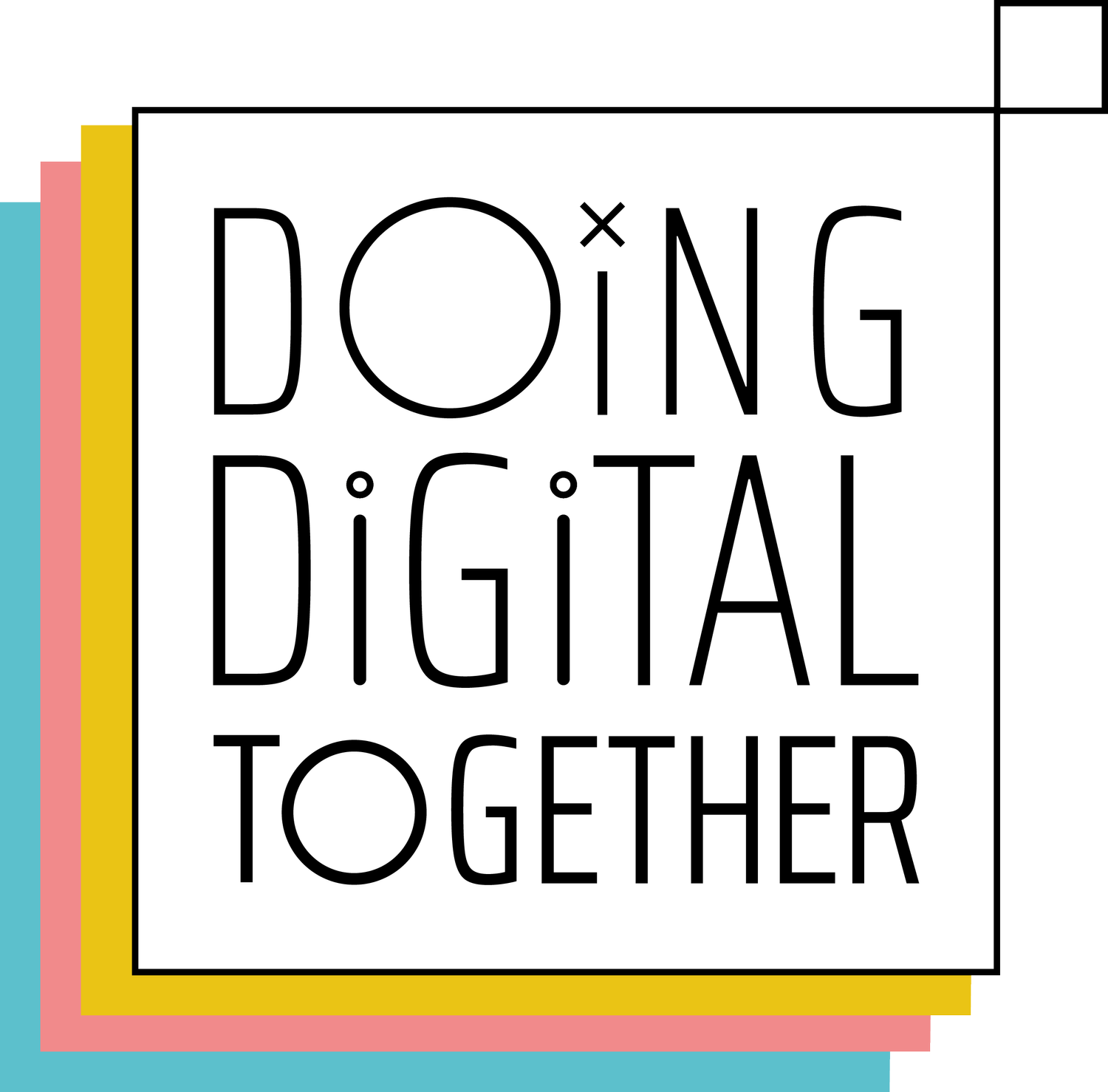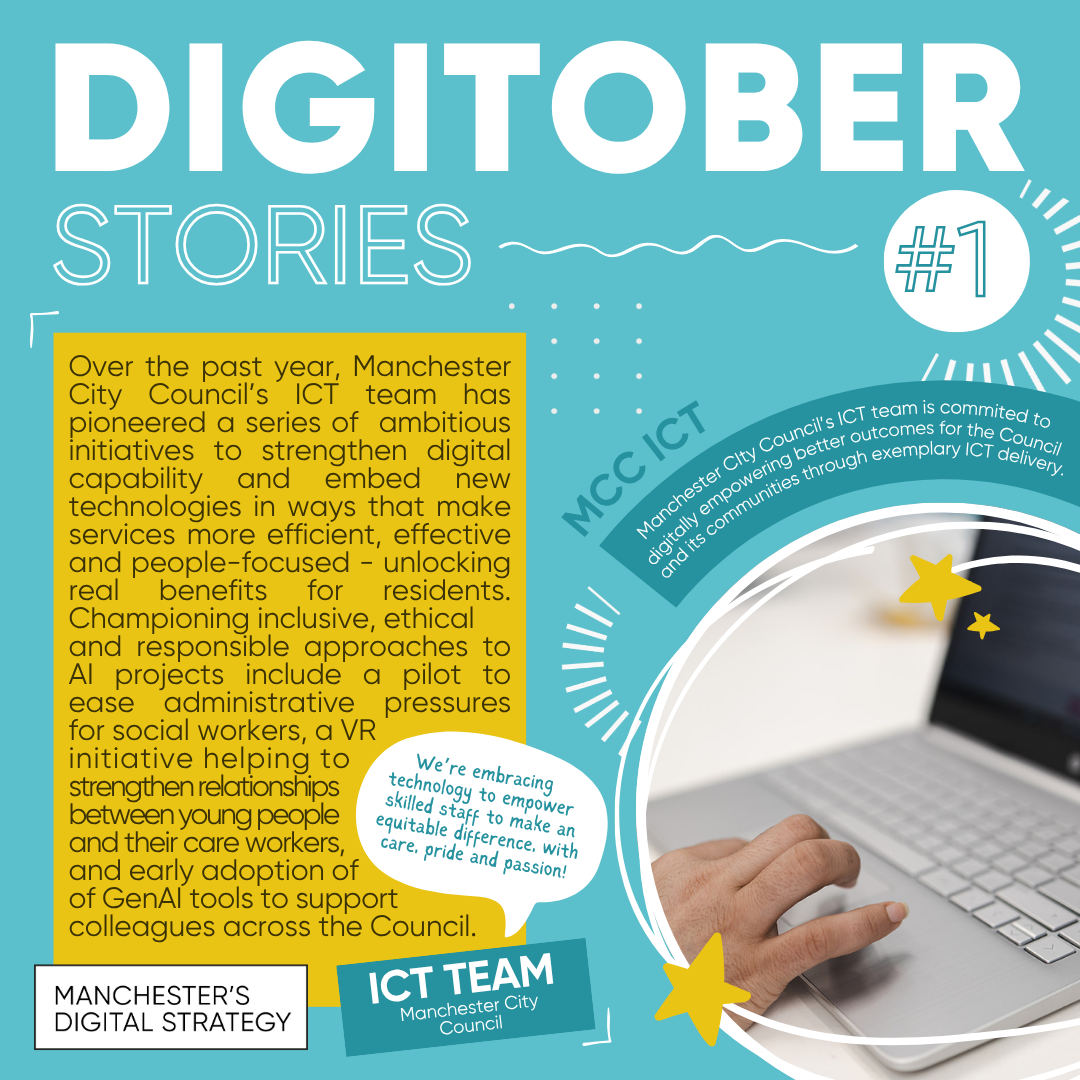Digitober Stories: How Manchester’s City Council’s ICT Team is Shaping the Future of Public Services
Manchester City Council’s ICT team aims to achieve better outcomes for the Council and its communities using inclusive, secure and connected technologies to underpin exemplary ICT and service delivery.
Artificial Intelligence is all around us. Whether or not we choose to actively engage with AI, its prevalence in the systems around us and the services we rely on mean that its impact is felt in almost every aspect of our everyday lives. From hospital systems detecting early signs of illness to online banking – and even your voice assistant’s reminder to take dinner out of the oven! – AI is transforming how we navigate and experience the world.
To ensure that the opportunities of these new technologies are shared equitably, local authorities have an important role to play in shaping responsible approaches to AI. While there is immense potential for AI to drive economic growth, revolutionise public services and improve people’s lives, ethical considerations must be balanced against technological progress. To protect residents from harm and prevent new innovations from amplifying existing inequalities, AI adoption must be underpinned by fundamental human values.
As one of the fastest growing deep technologies in the world, AI development shows no signs of slowing down. According to Forbes, around one in six UK organisations are using at least one AI technology in 2025, with the number of UK AI companies increasing by over 600% in the last ten years. For the benefits of adoption to reach all people, it’s vital that local services evolve alongside advances in technology.
Manchester’s City Council’s ICT and Digital Strategy sets out a clear ambition to embrace inclusive technologies to enhance service delivery and achieve better outcomes for the Council and its communities. Through championing inclusive, progressive and responsible approaches to innovation, the Strategy offers a framework to drive ethical innovation that improves public services and make life better for people across the city.
Over the past year, the Council’s IT team has pioneered several initiatives to strengthen digital capability and embed new technologies that improve the efficiency and impact of services, unlocking widespread benefits to residents.
In 2025, the Council concluded a successful pilot programme to evaluate the impact of Microsoft Copilot across teams including PA, Finance, Adults and Waste and Recycling. Through piloting this Proof of Value programme on a small scale, the IT team were able to engage directly with users to better understand the potential benefits and challenges of wide-scale adoption, supporting decision-making around wider implementation.
Empowering Council staff to use Generative AI tools has already delivered significant benefits across services. Automating routine tasks such as note taking, content editing and summarising meeting minutes has helped teams to increase their efficiency, with staff members praising the hours of time saved by embedding Copilot into their workflow. Crucially, streamlining administrative tasks has supported staff to increase their capacity and focus on delivering the priorities most likely to achieve meaningful outcomes for residents.
By taking an iterative approach to AI implementation, learnings from the pilot – including the needs, wants and concerns of real users - could be embedded in delivery approaches and strategic plans for wider adoption.
During the initial Proof of Value pilot, some users struggled to effectively navigate Copilot and to make best use of its capabilities. To bridge these knowledge gaps, which prevented staff members with lower digital literacy from equally benefiting from Copilot’s introduction, future delivery phases will embed use case templates and opportunities for peer learning.
Through listening to Council colleagues and carefully evaluating the potential impact of Generative AI across different services, the ICT team aims to maximise the benefits of Copilot to amplify the positive impact on services and residents.
The Proof of Value pilot forms part of a broader roadmap to embed AI and Automation responsibly across the Council. Underpinned by a robust policy offering clear guidance for the use of AI tools, rooted in human-centric value and drawing on OpenAI’s Safety Best Practices, the Council’s Generative AI pilots aim to empower staff to use AI for the public good.
For many social workers, transcribing and summarising notes from client meetings can be a significant administrative burden, diverting focus from direct client care. As the demand for adult social care services continues to rise, existing care frameworks have become increasingly stretched, placing added pressure on frontline teams.
A new pilot, developed by the ICT team using Copilot Facilitator and agents, aims to alleviate the growing administrative load on social workers. Using Facilitator, staff in Adult Social Care can generate meeting summaries, case notes and follow-up actions from recordings of client sessions.
In a pilot engaging residents already likely to experience multiple barriers, ethical considerations were paramount to avoid perpetuating harm. Before adoption within real client sessions, social workers received hands-on training to learn how to use the tool and address potential concerns. After being provided with a full explanation of the tool, clients were also offered a choice whether to participate and to provide feedback, offering an opportunity to shape the tool’s future development.
By reducing reliance on manual transcription, Facilitator enables social workers to focus entirely on their conversations with clients. Balancing the responsibility of maintaining accurate records with the desire to be fully present of clients can often lead social workers to spend time completing reports after visits have taken place. The pilot aims to help social workers prioritise meaningful engagement with clients during care visits, while also building comprehensive summaries to build a reliable and consistent record of care.
To ensure that the tool met the needs of those it was designed to serve, it was essential to listen to the views of social workers and their clients. To assess the effectiveness of the solution, the IT and Adult Social Care teams launched an eight-week pilot to trial Facilitator in real-world scenarios. By reviewing feedback from residents and frontline staff, the IT team could better evaluate benefits, challenges and risks of adoption and ensure the tool’s suitability for frontline practice. Based on positive responses to the initial pilot, the programme will be extended by a further six weeks to gather additional insights and expand participation to a wider group of users.
In both pilots, adopting a considered approach to digital transformation was crucial to mitigating barriers to adoption and reducing organisational risk. Identifying challenges during the discovery phase enabled targeted solutions to be put in place before a wider rollout, creating a strong foundation for sustainable adoption and ensuring equitable support for all staff members.
Alongside embedding AI-enabled tools to enhance the impact and efficiency of the Council’s operations, the ICT team aims to empower people across the city to directly experience and benefit from new technologies.
A new virtual reality initiative in Children’s Social Care, enabled by the Council’s ICT team, will use META headsets to help strengthen relationships between social workers and young people in their care. Using VR, the pilot aims to offer young people new ways to express themselves and explore how immersive experiences can build trust, improve communication and boost emotional well-being.
For many young people, social and economic barriers can stand in the way of opportunities to try out new digital tools. The programme offers young people the opportunity to experiment with technology that may otherwise feel out of reach, while building their confidence and developing practical life skills. Empowering young people to safely experiment with new innovations can not only help to build digital literacy but also broaden a young person’s horizons to ignite new passions. Opportunity of experience is essential to address inequalities and narrow the digital divide.
An open and innovative approach to technology, designed for and with users in mind, is fundamental to the Council’s ICT and Digital Strategy. Across all three digital initiatives, the Council aims to use technology to deliver positive social impact across services and society – whether through supporting staff to amplify the impact of their work or leveraging new technologies to address key challenges across the city.
By leading the way in instigating the use of innovative digital tools and technologies, the ICT team aims to streamline processes, resolve long-standing challenges and lay the right foundations to fully leverage the transformational capabilities of digital and technology. By championing inclusive, responsible and ethical approaches to AI and Automation in practice and policy, Manchester City Council aims to ensure that the benefits of technology are felt equitably by everyone in our city.
To learn more about how Manchester City Council is harnessing technology to deliver better outcomes for everyone in our city, explore the full ICT and Digital Strategy.

